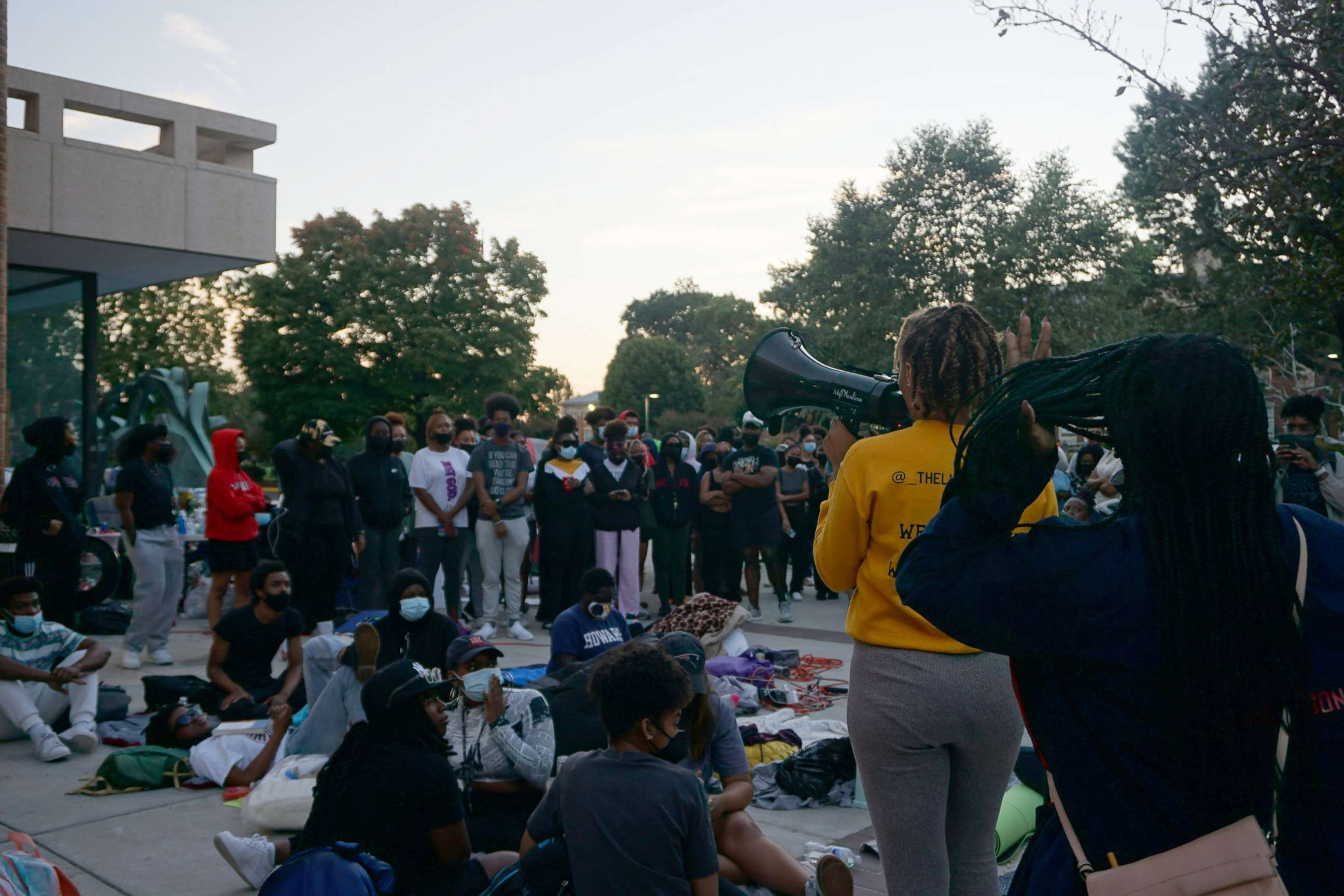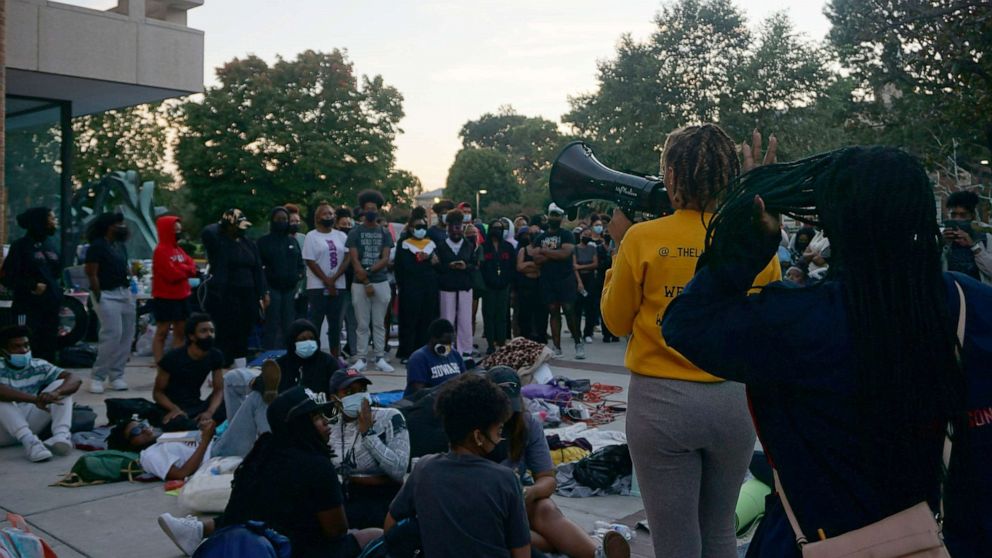Howard University reaches agreement with students after month of protests
After a 34-day protest garnered local and national attention, Howard University said it has reached an agreement with its students, who demanded better living conditions in on-campus dormitories.
On Oct. 12, Howard students began occupying the Blackburn center, a student hub and cafeteria located in the central yard of the campus, transforming the area into a "tent city."
The protests continued until Monday, Dr. Wayne Frederick, president of Howard University, said, and would come to be known as #BlackburnTakeover across social media platforms.
Several students told ABC News that they faced a host of health concerns, including mold, infestations, and flooding in some college dorms. In October, Howard University officials listed 34 reports of concerns related to discoloration, or suspected fungal growth, across more than 5,050 beds -- 0.67% of all on-campus beds.
The problems were allegedly so bad that many students preferred to sleep outside, in tents and sleeping bags, rather than in the university's dorms. That is how the "tent city" protests began.

Students take action
"About one month ago, student protesters initiated their occupation of Blackburn. Today, they agreed to leave," Frederick said in a statement Monday, adding that he also expected non-student protesters to depart the surrounding area and end their occupation of the campus.
The agreement came after days of negotiations and various threats of legal action from the students.
"I was shocked that they were willing to have a conversation, because it took them a long time to even say anything to us about the protest," said Lamiya Murray, an 18-year-old freshman and the main organizer of the demonstration.
"The students have achieved the objectives and something meaningful. What they got by their personal sacrifice was sunlight put onto Howard in a way that a private academy normally wouldn't receive," Donald Temple, the students' attorney, told ABC News. "Howard is private, and so is Howard's policy and procedures, but the accountability from students, faculty and alumni are bigger."
Temple, a Howard alumnus, said he's represented Howard University student protestors for years, including during a 1989 protest in which they were advocating for similar demands.
"This double standard exists within these HBCUs, and students are attending these colleges which are underfunded when all these kids are saying they want competitive education and proper conditions," Temple added.
Demonstrators such as Murray and Deja Redding, a Howard University graduate student and director of The Live Movement, a campus-based organization focused on advocating for racial equity in education, said they faced verbal threats from University administrators due to their involvement in the movement. They were even told they could face expulsion.
Murray, who spent nearly 33 nights in a tent outside the center, said she was worried about the wellbeing of the students and fearful of what the outcome of the protests would be.
"I ended up having to talk myself into doing a lot of stuff anywhere from sleeping outside to using the bathroom and Porta Potty," Murray told ABC News. "Am I willing to sit here in the cold for these demands? I had to talk myself into it most nights, and I just realized that what I'm doing is bigger than just me, bigger than Howard, bigger than an HBCU; it's revolutionary."
In their protests, students demanded an in-person town hall with Howard's president and other officials, the permanent reinstatement of student, alumni and faculty affiliate positions that are being removed from the school's board of trustees, a meeting with university leaders about housing and legal, disciplinary and academic immunity for protesters. Student organizers also want to weigh in on Howard's new housing plan.
"As we close in on the Thanksgiving holiday, I am encouraged and excited about the work we have accomplished — and the work we will continue to do — together to reinforce Howard University," Frederick said in his statement Monday. "I look forward to sharing details soon on our ideas that will address concerns and build a culture where all are heard."
He added that Howard plans to make improvements throughout the campus, and is committed to maintaining "safe and high-end housing."
Even though they reached an agreement with the university on Monday, students said the school did not agree to all their requests, specifically the re-election of the student and alumni on the board of trustees.
Murray and Redding said they plan to take legal action.
Protest goes viral
Howard, known to some as "The Mecca," is one of the most notable historically Black colleges and universities. The students' outcry sparked attention from Howard's high-profile alumni, including Yandy Smith and Debbie Allen, as well as other HBCU alumni, such as Rev. Jesse Jackson, who graduated from North Carolina Agricultural and Technical State University.
"The leadership saw these students as renegades who did not represent the larger student body, even though their issues affected thousands of kids," Temple said. "They weren't by themselves. The alumni and the nation were right behind their shadows."
Because Howard provides priority housing for freshman and sophomores, the alumni network plays a prominent role in providing additional housing resources to Howard's juniors, seniors and graduate students.
"Some of the behind-the-scenes things that people don't know or see is that alumni activated a platform to house a lot of these students who are unable to live in their dorms or just weren't able to get housing," Redding said.
Now, Howard students hope their successful movement inspires others at HBCUs in need of improvements to speak up.
"These students should be able to hold their administration accountable. Plenty of other HBCUs have reached out with the intention to go ahead and start moving towards holding a demonstration on their campus, maybe not to the magnitude of Howard's, but they're looking to have a demonstration of some sort on their own needs that they have," Redding said.
Howard's student organizers told ABC News, they're expected to hold a town hall with the University on March 1, 2022, as part of the agreement.
They are also calling for Frederick's resignation.
ABC News' Adia Robinson contributed to this report.




